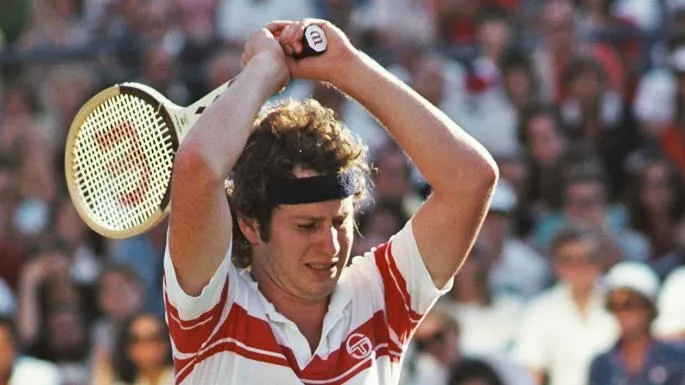
Tennis is a sport with many psychological challenges. The unique scoring system constantly builds up to pressure points where one player is poised to take all, the other to lose all. Matches have no time limit, and can last for many hours. In singles, players are alone, usually without access to a coach.
No wonder so many players end up losing their temper, often in spectacular fashion.
By studying player tantrums we can learn a great deal that can help us improve our psychological approach to tennis, or indeed any sport.
Here are five classic tantrums, each one with a distinct lesson to teach us.
5) Grigor Dimitrov, Istanbul 2016
Dubbed ‘Baby Fed’, Dimitrov was once talked of as a successor to Roger Federer, but no longer. Despite reaching a career-high ranking of eighth and the Wimbledon semifinal in 2014, the Bulgarian has struggled to compete with the game’s elite, and has not yet been able to translate his rare talent into consistent world-class form.
Few players have been hyped by the media as much as Dimitrov. The pressures of expectation, coupled with low-confidence, seem to have led the 25-year old to his recent implosion in the final of the Istanbul Open. Dimitrov forfeited the match after smashing three rackets, handing the title to his opponent Diego Schwartzman.
Dimitrov has never sought help from a tennis psychologist, which suggests that he underestimates the value of the mental game. He needs to learn how to disengage from his thoughts and emotions, and focus on the task in hand. If he does this, he has the talent to get back to the top ten and stay there.
Lesson: The expectations of others can be a mental burden on court. We need to learn how to allow our difficult thoughts and emotions to be there without engaging with them.
Roger Federer is the epitome of a cool, calm and collected champion, but it wasn’t always this way. In his early years on tour, the Swiss maestro expressed a hot temper on court, with his racket often bearing the brunt of his anger.
In 2001, knowing his emotions were holding back his game, Federer worked hard on improving his mental approach. This paid off handsomely, as Fed began his meteoric rise to the top soon after.
Rarely since have we seen Roger lose his temper. However in this clip from his 2009 match against Novak Djokovic in Miami, the Swiss’ temper burned bright one more time following a string of forehand errors.
This proved a one-off lapse, and Roger has maintained his trademark composure ever since. We should take comfort in the fact the one of the greatest of all time can have a serious mental off-day. It reminds us that none of us can be perfect.
Lesson: Even players who have exemplary mental skills can have lapses. That’s fine, as long as we reconnect quickly with a successful mental approach. Forgive yourself if you lose your temper, and move on.
3) Carlos Berlocq – Aix en Provence 2016
This extraordinary incident, in which Berlocq smashes his racket on just the second point of the match, indicates that the Argentinian wasn’t in a good mental state when he stepped onto the court.
There will always be off-court stresses in our lives, and sometimes we can’t help it if thoughts and emotions which have nothing to do with tennis interfere with our game.
The trick is to learn how to let go of those feelings. Let them be there, don’t engage.
Lesson: We always bring some sort of emotion onto court with us. When those emotions are negative, we need to learn to let go of engagement with them, or they are liable to lead us to perform poorly.
2) John McEnroe, Australian Open 1990
McEnroe may be the king of the tennis tantrum, but he’s also an honest and insightful judge of his own behavior. In his autobiography Serious, McEnroe says that his struggle with on-court anger hindered his progression as a player. His temper disrupted his rhythm, and often indicated he was on the verge of choking. He sees his anger as a response to nerves and a fear of failure. Brilliant as he was, McEnroe would have been a better player if he had been mentally stronger.
He never won the Australian Open. A series of warnings for bad behavior led to his disqualification from this fourth round match in 1990.
Lesson: Tantrums are self-destructive. To maximize your potential as a player, you have to develop a strong mental game.
1) David Nalbandian, London 2012
Nalbandian will be remembered as one of the best players never to win a Slam. He’ll also be remembered for his fiery temper, and in particular for his outburst in the 2012 Queens final which cost him the match. A momentary burst of anger led Nalbandian to kick an advertising board which struck a linesman in the leg hard enough to draw blood. Game over. Instant disqualification.
Of course injuring the linesman wasn’t intentional, but Nalbandian’s inability to tolerate and let go of his anger handed a winnable final to his opponent and landed him with a $12,560 fine.
Lesson: Anger can arise quickly during a match if we make a mistake or lose an important point. We need to learn how to allow anger to be there without responding to it.
Its not only your strokes that we can help you with at Courts Plus, it’s your entire game, including the most important part, the mental part. There’s a reason why people say tennis is 90% mental and 10% physical. All of the top players can execute their shots in practice, but only a few can do it when it really matters and stay calm under pressure. Schedule a lesson time today, before you end up on this list!



